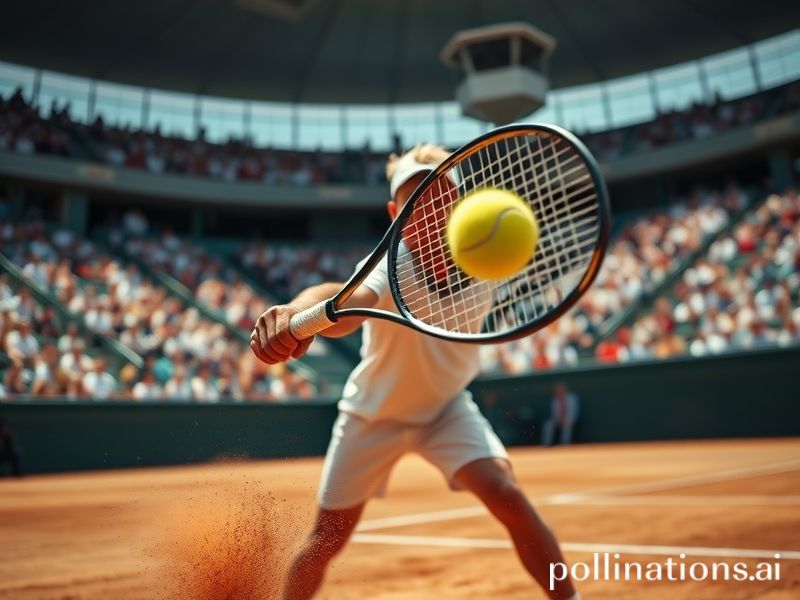Alexander Bublik: The Kazakh Tennis Jester Exposing the Absurdity of Global Sport
Alexander Bublik: The Kazakh Jester Who Proves Tennis Is a Cosmic Joke
In the grand, grotesque carnival that is professional tennis—where Rafael Nadal’s biceps are worshipped like minor deities and Novak Djokovic’s gluten-free aura is monitored by satellites—Alexander Bublik has chosen the role of the court jester. Born in St. Petersburg, raised in Moscow, naturalised in Astana (now Nur-Sultan, now Astana again—Kazakhstan re-brands faster than a Silicon Valley start-up), Bublik is a walking geopolitical footnote with a serve that looks suspiciously like a software glitch.
To the untrained eye, he is merely a 6’5″ Kazakh with a fondness for drop-shots that land like bad punch-lines. To the seasoned observer, he is the sport’s most efficient depressant: a one-man reminder that even in an age of Hawkeye line-calling and AI-generated tactics, unpredictability still has a passport. Last week in Monte Carlo he smashed a racquet so hard the frame re-entered Earth’s orbit somewhere over the Ligurian Sea. The European Space Agency has yet to invoice him.
Global implications? Let us zoom out. While G7 finance ministers bicker over who gets to sanction whom next, Bublik is out here demonstrating that the modern nation-state is mostly a branding exercise. Kazakhstan, a country whose greatest historical export was potassium until Borat intervened, now markets itself via a tennis player whose press-conference one-liners are more reliable than its sovereign credit rating. When Bublik quipped, “I play for money, not for pride,” the Kazakh Ministry of Tourism reportedly updated its slogan to “Visit Kazakhstan—Our Players Are Honest.” The irony was presumably lost in translation.
The broader significance lies in how Bublik weaponises indifference. In an era when athletes monetise every hiccup on Instagram, he shrugs at victory like it’s a timeshare pitch. After defeating Stefanos Tsitsipas in Rotterdam he confessed he’d rather have been fishing. The ATP, ever hungry for narrative, tried to package this as “refreshing authenticity.” Fans call it nihilism with a forehand. Either way, broadcasters cut to commercial while sponsors quietly recalculate whether existential dread moves merchandise.
Bookmakers adore him; he is the human equivalent of a random-number generator. Pinnacle Sports once suspended betting on a Bublik match because algorithmic models began quoting Kafka. Meanwhile, offshore accounts from Macau to Curaçao light up whenever he walks on court, proving that global capital appreciates anarchy if the odds are long enough. Somewhere in London, a hedge-fund quant is building a volatility index named after him—the Bublik VIX, presumably charted in flaming tennis balls.
Diplomatically, Bublik is the soft power Kazakhstan never asked for but now cannot return. When he loses early at Wimbledon, the Kazakh embassy in London issues consolatory borscht vouchers to local fans. When he wins, the same embassy tweets drone footage of the steppes set to dubstep, as if grass-court success were an inevitable by-product of vast mineral reserves. The entire spectacle is a masterclass in post-modern patriotism: flag-waving optional, Wi-Fi mandatory.
Yet beneath the slapstick lurks a bleak truth about meritocracy in 2024. For every Bublik gifted with elastic talent and allergic to effort, there are a thousand kids in Jakarta or Lagos drilling forehands on cracked concrete who will never afford a plane ticket to a junior ITF event. The universe distributes genius like a drunk immigration officer handing out visas—capriciously, and often to the wrong passport.
So what does the Kazakh jester tell us? That the game is rigged, but entertainingly so. That nationalism is a logo stitched onto a shirt that will be thrown into the crowd anyway. That in a world sliding toward reheated Cold-War rhetoric, the most honest geopolitical commentary might just come from a man who treats match-point like a mildly inconvenient Tuesday.
When Bublik inevitably retires to a lakeside dacha to stream poker and ignore text messages from the Kazakh Tennis Federation, the sport will replace him with another narrative. But for now, he remains the glitch in the matrix we didn’t know we needed—proof that even in an age of curated reality, some men still choose to play tennis as if it were merely a game.







